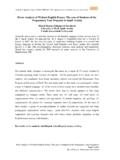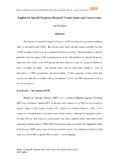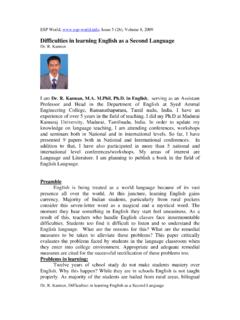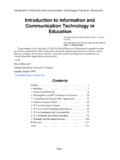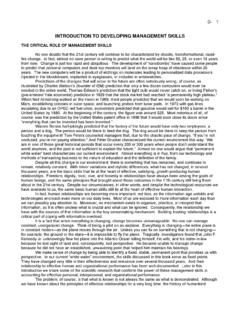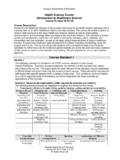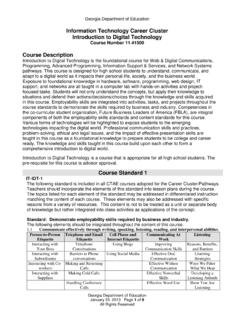Transcription of Teaching Oral Communication Skills: A Task-based …
1 ESP World, Issue 1 (27), Volume 9, 2010, Teaching oral Communication skills : A Task-based Approach M. Mojibur Rahman 11 Teaching oral Communication skills : A Task-based Approach M. Mojibur Rahman Assistant Professor Department of Humanities and Social Sciences Indian School of Mines University, Dhanbad Abstract oral Communication fulfills a number of general and discipline-specific pedagogical functions. Learning to speak is an important goal in itself, for it equips students with a set of skills they can use for the rest of their lives.
2 Speaking is the mode of Communication most often used to express opinions, make arguments, offer explanations, transmit information, and make impressions upon others. Students need to speak well in their personal lives, future workplaces, social interactions, and political endeavors. They will have meetings to attend, presentations to make, discussions and arguments to participate in, and groups to work with. If basic instruction and opportunities to practice speaking are available, students position themselves to accomplish a wide range of goals and be useful members of their communities.
3 ( ) This paper describes the applications of the Task-based approach to teach oral Communication skills in an academic setting. A course oral Communication skills is taught to the students of Engineering and Technology at Indian School of Mines, Dhanbad to make them proficient in oral skills . The present study tries to explore the possibility and feasibility of Task-based approach to apply for the Teaching of oral Communication . Key Words: oral Communication , Task-based approach, dimensions of oral Communication , academic setting. Introduction The present study is based on the author s four years classroom experience at Indian School of Mines.
4 The author has been Teaching oral Communication Courses since 2005. At ISM students come from all over India through Joint Entrance Examination conducted by Indian Institute of Technology. Their schooling is with different medium of instruction. They take a course English for Science and Technology in first year. The course oral Communication skills is taken by those students who are less proficient in oral Communication . ESP World, Issue 1 (27), Volume 9, 2010, Teaching oral Communication skills : A Task-based Approach M. Mojibur Rahman 22 With the globalisation, calls have been made for graduates to be proficient in oral Communication skills so that they can function effectively in the academic and Professional setting.
5 Consequently, oral Communication skills course is included in undergraduate classes. Despite the need, and the varied ways of including oral Communication skills in curriculum, there appears to be little research available that provides a more precise understanding of the methods and approaches of Teaching oral Communication for undergraduate students. oral Communication covers a wide area, ranging from formal presentations to participation in teams and meetings. This paper tries to seek the possibilities to apply Task-based approach in Teaching oral Communication skills .
6 This study reports on an investigation into the Teaching of oral Communication to the students of Engineering and Technology at Indian School of Mines. The paper first describes the dimensions of ' oral Communication skills ' and Task-based approach'. It then introduces the institutional contexts in which the oral Communication skills course is offered, and the goals of this particular course. The paper concludes with some remarks on the strengths and the limitations of applying Task-based approach in Teaching oral Communication skills . oral Communication skills For successful Communication , students require more than the formal ability to present well and a range of formulaic expressions.
7 Successful Communication is context-dependent and therefore embedded in its particular discourse community (Bizzell, 1989). oral Communication reflects the persistent and powerful role of language and Communication in human society. As Halliday (1978, p. 169 explains, Communication is more than merely an exchange of words between parties; it is a ..sociological encounter (Halliday, p. 139) and through exchange of meanings in the Communication process, social reality is created, maintained and modified (Halliday, p. 169).)
8 Such a capacity of language is also evident in Austin s (1962) earlier work on speech act theory where, as cited by Clyne (1994, p. 2), language and thus Communication is an ..instrument of action . Speech act theory, concerned with the communicative effect, that is, the function and effect of utterances, dissects an utterance into three components: the actual utterance (the locution); the act performed by the utterance (the illocution); and the effect the act has on the hearer (the perlocution). Searle s (1969) work further defined speech acts as directives, imperatives, requests, and so on.
9 Communication is a dynamic interactive process that involves the effective transmission of facts, ideas, thoughts, feelings and values. It is not passive and does not just happen; we actively and consciously engage in Communication in order to develop information and understanding required for effective group functioning. It is dynamic because it involves a variety of forces and activities interacting over time. The word process suggests that Communication exists as a flow through a sequence or series of steps. The term process also indicates a condition of flux and change.
10 The relationships of people engaged in Communication continuously grow and develop. ESP World, Issue 1 (27), Volume 9, 2010, Teaching oral Communication skills : A Task-based Approach M. Mojibur Rahman 33 Communication is an exchange of meaning and understanding. Meaning is central to Communication . Communication is symbolic because it involves not only words but also symbols and gestures that accompany the spoken words because symbolic action is not limited to verbal Communication . Communication is an interactive process. The two Communication agents involved in the Communication process are sender (S) and receiver (R).


